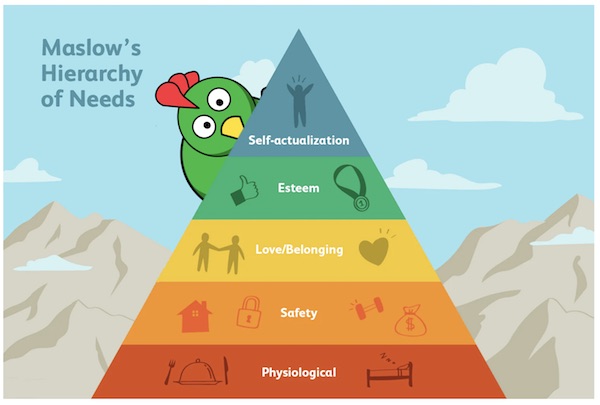
Giuseppe Sanmartino The veiled Christ (Christo velato) 1753

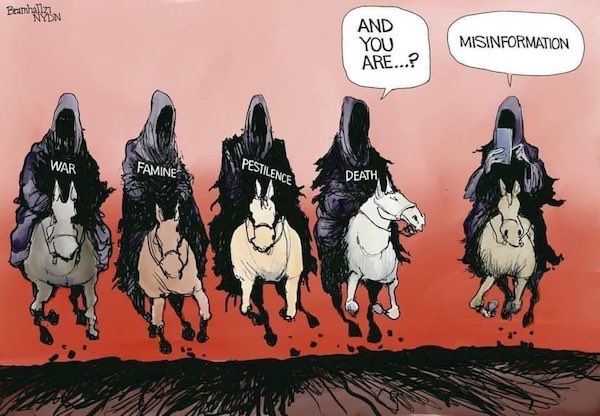



MacGregor Poland
Former Trump advisor Douglas Macgregor on why the West should be thinking twice about involving Poland in weapons supply against a conflict involving Russia. pic.twitter.com/0pFQFHKM8O
— Wittgenstein (@backtolife_2022) April 30, 2022



Putin Guterres
Putin to UN Chief: Kyiv should simply 'let people go', or they're 'acting like ISIS in Syria' pic.twitter.com/AO4fQv3oZZ
— Wittgenstein (@backtolife_2022) April 30, 2022

Pelosi Ze
Speaker of the House of Representatives of the US Congress Nancy Pelosi met with Vladimir Zelensky in Kiev. pic.twitter.com/3ntmsD5Blr
— Wittgenstein (@backtolife_2022) May 1, 2022

The weapons deliveries need the story that Russia is failing, i.e. Ukraine can “win”. In the UK, politicians actually believe that story.
• Vladimir Putin May Declare New World War In Days: UK Defence Secretary (Mirror)
Vladimir Putin could declare a new world war in the coming days, the UK defence secretary has warned. Ben Wallace said that the Russian leader may start a “mass” mobilisation and use May Day to announce a war on the world’s “Nazis”. Putin started the Russian invasion of its neighbour on February 24 saying that it was a special operation to rid Ukraine of Nazis. Since then Ukrainian cities have been pummelled by shelling in a battle which government minister Liz Truss has said could go on for 10 years. And in the face of the West providing money and armaments to Ukraine, Russia has referred to its nuclear capabilities in threats to not get involved. Russian Foreign Minister Sergei Lavrov said that the “danger is serious” of a nuclear war.
Now Mr Wallace told LBC that Putin having “failed” in most of his objectives in the war with Ukraine may declare war on the “world’s Nazis”. He said: “I would not be surprised . . . that he is probably going to declare on May Day that ‘we are now at war with the world’s Nazis and we need to mass mobilise the Russian people’.” He continued: “Putin, having failed in nearly all objectives, may seek to consolidate what he’s got . . . and just be a sort of cancerous growth within the country. We have to help Ukrainians effectively get the limpet off the rock and keep the momentum pushing them back.” At the same time around 8,000 British Army troops are to take part in exercises across eastern Europe to combat Russian aggression in one of the largest deployments since the Cold War.
Dozens of tanks will be deployed to countries ranging from Finland to North Macedonia this summer under plans that have been enhanced since the invasion of Ukraine. Mr Wallace said the “show of solidarity and strength” will see UK service personnel joining with NATO allies and those from the Joint Expeditionary Force alliance, which includes Finland and Sweden, for the exercises. The Ministry of Defence (MoD) said the action had been long planned, but that it had been enhanced since Russia invaded its neighbour in late February.

“..the apocalyptic sense that permeates our lives because of demonic technology and its use to transform humans into machines who can’t think clearly enough to perceive reality..”
• It’s About Time (Edward Curtin)
With the start of World War III by the United States “declaring” war against Russia by its actions in Ukraine, we have entered a time when the end of time has become very possible. I am speaking of nuclear annihilation. I look down at my great-uncle’s gold Elgin pocket watch from the 19th century. His name was John Patrick Whalen, an Irish immigrant to the US who fled England’s colonialist created famine in Ireland. It tells me it is 5:15 PM on April 21, 2022, a date, coincidentally, with a history. No doubt John looked at his watch on this date in 1898 when the United States, after the USS Maine exploded from within in Havana harbor (a possible false flag attack), declared war on Spain in order to confiscate Spanish territories – Cuba, Puerto Rico, Guam, and the Philippines.
One colonial power replaced another and then proceeded over the long decades to wage war and slaughter these island peoples. Imperialism never dies. It is timeless. One hundred and twenty-four years go by in a flash and it’s still the same old story. In 1898 the yellow press screamed Spanish devils and today it screams Russian devils. Then and now the press called for war. If the human race is still here in another 124 years, time and the corporate media will no doubt have told the same story – war and propaganda’s lies to an insouciant and ignorant population too hypnotized by propaganda to oppose them. This despite the apocalyptic sense that permeates our lives because of demonic technology and its use to transform humans into machines who can’t think clearly enough to perceive reality and realize the threat posed by that quintessential technological invention – nuclear weapons.
This is not uplifting, but it’s true. The nuclear weapons are primed and ready to fly. The US insists on its first-strike right to launch them. It openly declares it is seeking the overthrow of the Russian government. Russia says it will use nuclear weapons only if its existence is threatened, which has become increasingly so because of US provocations over a long time period and its current expanding arming of Ukraine’s government and its neo-Nazi forces.The Russian President Vladimir Putin and its Foreign Secretary Sergei Lavrov have just warned the US that such involvement has made nuclear war a “serious” and “real” risk, in Lavrov’s words “we must not underestimate it,” which is a mild form of diplomatic speech. Putin said that Russia has made all the preparations to respond if it senses a strategic threat to Russia and that response will be “instant, it will be quick.”
The US response is to shrug these statements off, just as it has done so for many years with Putin’s complaints about NATO forces moving up to its border. Incredibly, Biden has said, “For God’s sake, this man (Putin) cannot remain in power.”
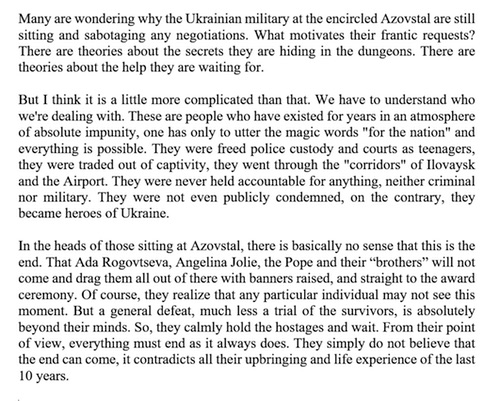
Donetsk war reporter Dmitry Astrakhan

“2022. Ancient Russian Lands (recently become known as Eastern and Central Ukraine), occupied, attacked and threatened by Nazi forces, trained and equipped by NATO..”
• What is the Collective West? (Batiushka)
1812. The Russian Empire was invaded by the French Empire, the Austrian Empire, the Kingdoms of Italy, Naples, Saxony, Bavaria, Westphalia, Wuerttemburg, Prussia, Spain and Denmark, the Swiss Confederation, the Grand Duchies of Hesse, Berg and Baden and the Duchy of Warsaw. The result? Although the Collective Western forces reached Moscow, they had to retreat with hundreds of thousands of deaths and in 1814 Russian troops liberated Paris from the tyranny of Napoleon.
1853. The Russian Empire was invaded by France, Great Britain, Sardinia and the Ottoman Empire, supported by the Austrian Empire. This war, miscalled ‘The Crimean War’, included the invasion of the Russia through the Crimea, an attempted British invasion of Siberia from the Sea of Japan and the shelling by the British Navy of a Russian monastery from the White Sea. It lasted until 1856. The ending came when the British blew up the Russian dock installations of Sebastopol (Sevastopol), built ten years before by British engineers. For this ‘achievement’, 500,000 human-beings had died as a result of French and British Imperialism, mainly of disease. Another consequence – in 1867 Russia sold Alaska to the then friendly USA, and not to the enemy British Canada.
1914. The Russian Empire was invaded by Germany, Austria-Hungary, the Ottoman Empire and the German puppet kinglet of Bulgaria. After immense struggles, the enemy advanced only as far as Poland and Lithuania, never even entering Russian territory. The Russian Imperial Army, suffering fewer losses than the French and Germans on the Western Front even though facing twice as many enemy troops, was headed for total victory in summer 1917. However, in early 1917 the Russian Empire was overthrown by a British-orchestrated coup d’etat and implemented by a fifth column of treacherous Russian aristocrats (i.e. oligarchs, in modern language), generals, politicians, journalists and lawyers. We know what happened next.
1941. The Soviet Union was invaded by the troops of Fascist Germany, Romania, Finland, Italy, Hungary, Slovakia, but these were supported by detachments of Nazi troops from a great many Western countries, including France, Belgium and Norway. The result? Despite the slaughter of 27 million Soviet citizens by the genocidal Nazis who treated the Soviet peoples as wild animals to be massacred, in 1945 Soviet troops liberated Berlin, discovering the gruesome charred remains of the suicide Hitler.
2022. Ancient Russian Lands (recently become known as Eastern and Central Ukraine), occupied, attacked and threatened by Nazi forces, trained and equipped by NATO (the North American Terrorist Organisation), consisting of 30 states led by the USA, are being liberated. They are being freed by Russian forces fighting in what is not a Russian war against the Ukraine but a NATO proxy war against the Ukraine.

“..unnamed US officials told NBC News that “there is no evidence Russia has brought any chemical weapons near Ukraine,” adding that Washington hurled the accusation merely to “deter Russia from using the banned munitions.”
• Russian Cyber Attacks Fail to Materialize (LI)
One month after President Joe Biden warned Americans to prepare for cyberattacks from Russia, a US official said that Washington still has yet to detect any. The US Cybersecurity and Infrastructure Security Agency (CISA) has assessed that Russia has not breached US systems, with agency head Jen Easterly saying the administration has “not seen attacks manifest here.” “To date, we have not seen specific attacks on the US. What we are concerned about is the fact that Russia’s malicious cyber activity is part of their playbook,” she said in a statement on Thursday. Easterly did mention that American economic penalties could provoke Russian cyber operations in the future, despite the lack of such breaches to date. “We are very concerned that as the war drags on, there may, in fact, be retaliatory attacks given the very severe sanctions we have imposed on the Kremlin, the US and our allies,” the agency head continued.
In a March 21 speech, Biden told Americans that “the magnitude of Russia’s cyber capacity is fairly consequential, and it’s coming,” ominous warning of major hacks on the horizon. The Biden administration has issued several similar alerts that have failed to materialize. The White House has warned for months that Moscow could deploy chemical weapons and has even shipped protective equipment to Kiev’s forces to prepare for such an attack. On April 6, however, a series of unnamed US officials told NBC News that “there is no evidence Russia has brought any chemical weapons near Ukraine,” adding that Washington hurled the accusation merely to “deter Russia from using the banned munitions.”

Still, the narrative of the “Russian Cyber Attacks” works miracles to get funding.
• Ukraine War Speeds Up US Cyber Agenda (Hill)
The war in Ukraine has pushed the United States to expedite its investment in cybersecurity amid constant — though so far unrealized — warnings of Russian cyberattacks on government agencies, election systems and critical infrastructure. Following the invasion of Ukraine, federal agencies have invested millions in cyber technology, seized and sanctioned hacking forums, charged Russian cyber criminals, and issued almost weekly warnings on the latest threat risks. Even lawmakers in Congress have stepped up their efforts, with the introduction of several cyber-related bills, and the passage of a new law requiring companies in critical sectors to report significant cyberattacks within 72 hours and ransomware payments within 24 hours.
The legislation passed in March as part of an omnibus spending bill that significantly increased funding for the Cybersecurity and Infrastructure Security Agency (CISA), which oversees federal cybersecurity infrastructure and enforcement. “The war in Ukraine is sort of a focusing event for getting some legislative initiative and momentum, and getting some public support that this is an issue that their representatives should care about,” said Jason Blessing, a research fellow at the American Enterprise Institute. “As terrible as the war has been, it’s an opportunity for the U.S. government to establish more robust cyber frameworks,” he added. Lawmakers have also held several committee hearings on cybersecurity over the last couple weeks, inviting experts – from the private sector and the government – to weigh in on current cyber threats and how to stop them.
Although many of these efforts predate the Russian invasion, experts say that the war in Ukraine gave the actions momentum and priority, such as lawmakers passing the cyber incident reporting law and the Department of Justice (DOJ) indicting Russian hackers. “The DOJ had clearly been investigating the hackers who were charged in March for some time prior to that announcement, but I think it’s possible that the war prompted them to go public with those charges sooner than they otherwise might have,” said Josephine Wolff, an associate professor of cybersecurity policy at the Tufts University Fletcher School. [..] Despite the U.S. sounding the cyber alarm, Russia is still showing restraint in the face of crippling economic sanctions. Experts and policymakers still warn that Russian cyber aggression is only a matter of time, particularly with midterm elections around the corner.

Supercalifragilisticexpialidocious
• The Perfect Nanny To Tidy Up Mess Of Free Speech (Turley)
“You can just call me the Mary Poppins of disinformation.” That Twitter intro to a TikTok parody of the song, “Supercalifragilisticexpialidocious,” is now indelibly connected to Nina Jankowicz, the new head of the federal government’s announced Disinformation Governance Board. Given her record of spreading disinformation and advocating censorship, Jankowicz hardly needed the musical-inspired persona. Yet, for the Biden administration, Jankowicz — like Mary Poppins — is “practically perfect in every way” to keep track on whether we all “measure up” in our public statements. It is still unclear from the administration’s public statements what authority the board will wield, but White House press secretary Jen Psaki described the board as intended “to prevent disinformation and misinformation from traveling around the country in a range of communities.”
President Biden already has established himself as arguably the most anti-free-speech president since John Adams. During his transition period, Biden appointed outspoken advocates for censorship; as president, he has pushed social media companies to expand censorship, while his administration has been criticized for spying on journalists. Now, with Elon Musk’s purchase of Twitter and his pledge to restore free-speech values to the platform, panic has set in among Democrats — including Jankowicz, who told National Public Radio that “I shudder to think about if free speech absolutists were taking over more platforms, what that would look like for the marginalized communities.”
Jankowicz’s singing voice may be impressive, but her appointment is tone-deaf. She has been ridiculed for pushing the false “Russian disinformation” claim about the original reporting on Hunter Biden’s infamous laptop, stressing that “we should view it as a Trump campaign product.” She continued to spread that disinformation, including tweeting a link to a news article that she said cast “yet more doubt on the provenance of the NY Post’s Hunter Biden story.” In another related tweet, she added that “emails don’t need to be altered to be part of an influence campaign. Voters deserve that context, not a [fairy] tale about a laptop repair shop.” Conversely, she cited Christopher Steele, author of the discredited “Steele dossier” during the 2016 presidential campaign, as a source on how to stop disinformation.

“The right to say what you want without being imprisoned is not the same as the right to broadcast disinformation to millions of people on a corporate platform..”
• Time Writer Knocks Free Speech As An ‘Obsession Of The Tech Elite’ (Fox)
In a Friday piece for Time magazine, the outlet’s national correspondent Charlotte Alter dismissed Elon Musk’s quest for free speech on Twitter as a white male “obsession,” and merely an entrepreneurial way to acquire influence and power in the world. She also claimed that Musk’s idea of free speech is about the right to spread “disinformation” and has nothing to do with the Founding Fathers’ original intent. Alter began her piece by insinuating that Musk should have put his $44 billion into something more worthwhile than what he sees as “free speech,” a phrase she put in scare quotes throughout the piece.
She wrote, “They say that something is worth what someone will pay for it. If that’s true, then protecting ‘free speech,’ which Elon Musk has cited as a central reason he agreed to buy Twitter for $44 billion this week, may be worth twice as much as solving America’s homelessness problem, and seven times as much as solving world hunger.” She added, “It’s worth more (to him, at least) than educating every child in nearly 50 countries, more than the GDP of Serbia, Jordan, or Paraguay.” The author then proceeded to wonder why a rich techie like Musk would even care about freedom of speech and how it “had become paramount concern of the techno-moral universe.”
She asked, “Why does Musk care so much about this? Why would a guy who has pushed the boundaries of electric-vehicle manufacturing and plumbed the limits of commercial space flight care about who can say what on Twitter?” She then cited professor of communication at Stanford University Fred Turner for the answer, who agreed, “It does seem to be a dominant obsession with the most elite.” He stated, “[F]ree speech seems to be much more of an obsession among men,” and part of “the entrepreneurial push: I did it in business, I did it in space, and now I’m going to do it in the world.”
Alter then claimed that “‘free speech’ in the 21st century means something very different than it did in the 18th, when the Founders enshrined it in the Constitution.” She elaborated, “The right to say what you want without being imprisoned is not the same as the right to broadcast disinformation to millions of people on a corporate platform. This nuance seems to be lost on some techno-wizards who see any restriction as the enemy of innovation.”

Burn your food.
• Diesel for Dinner (Doomberg)
Armed with humanity’s mastery of chemistry, we can now rearrange atoms with astonishing specificity at an unimaginable scale, pushing billions of people further up Maslow’s hierarchy than they would otherwise be. In addition to using fossil fuels to create most of the materials that surround us, we leverage them to produce fertilizers, herbicides, fungicides, and other inputs into the farming process, boosting crop yields to levels once thought impossible. We also synthesize mountains of edible ingredients directly from oil and gas. Touring a modern food processing factory would seem almost indistinguishable from a specialty chemical plant, mostly because they aren’t all that different.
While it makes perfect sense to leverage our bounty of fossil fuels and ability to manipulate them at the molecular level to increase global food abundance, going through the effort to grow food only to turn around and burn it for energy seems less than ideal. In a controversial piece we wrote in January titled “In Praise of Corn Ethanol,” we put forth a theory that the adoption of corn ethanol as a mandated additive to gasoline was a scheme to coverup one of the greatest environmental scandals of the past century: the use of tetraethyl lead as an anti-knock agent. While some readers interpreted our piece as supporting this policy – undoubtedly because of the title – our primary purpose was to highlight the ugly history that got us to the current situation, and how it was predominantly a dirty political compromise. In hindsight, “Why Corn Ethanol is a Thing” might have been a better title.
No such compromise underpins the decision to use foodstuffs as replacements for diesel, a policy that will make the unfolding global food crisis substantially worse if it is not soon overturned. Unfortunately for those near the bottom of Maslow’s pyramid, many cooking oils – liquid fat isolated from various crops used extensively in frying, baking, and other types of food preparation all over the world – have a molecular structure quite similar to that of diesel. It does not take much chemical magic to transform previously edible cooking oils into workable substitutes for the valuable fuel. Now that the environmental lobby has convinced government officials worldwide that “renewable carbon content” is prima facia a desirable thing – a fallacy that deserves its own Doomberg piece – various mandates exist to literally take food out of the mouths of the hungry and pump it into our trucks for burning. For the planet, and whatnot.

“..ambulances are being summoned for a lot more calls for cardiac events and sudden deaths: 40% more to be exact..”
• Vaccine Lies Are Finally Falling (Nass)
The kicker for childhood vaccines: the New York state Department of Health study of vaccine efficacy in children. After 2 months, efficacy in the 5-11 year olds had fallen to 12%. In other words, 7 out of 8 vaccinated kids derived no benefit after 2 months, only risk. The data were derived from 365,000 children, and apparently there was no way CDC could spin them, or 12% was the best spin they could put on the data. This report is a huge obstacle to universal child vaccinations. They cabal cannot surmount it. It is important to mention again — because we keep forgetting — that while the vaccines are nominally licensed for adults, in fact you can only find the EUA (unlicensed) product in the US, and legally an EUA is experimental — and therefore forcing someone to be vaccinated is a Nuremberg violation and a violation of federal law.
The imposition of mandates for these experimental gene therapy products is therefore a crime, being committed by states, federal government and certain companies and other institutions. It seems that because US law was not designed for situations in which the government is the criminal, it has been very difficult to use the judicial system to change what is happening. But surely if this persisted much longer an honest judge somewhere would finally rule that the vaccines are experimental and the COVID mandate house of cards would then collapse. Like Humpty Dumpty (it is Easter today after all): “All the king’s horses and all the king’s men couldn’t put COVID mandates together again.” What else has been happening that undermines the vaccine story?
Well, in addition to all the collapsing athletes, there is now a large collection of mayors suddenly dropping dead throughout Germany. In Australia, Queensland’s health minister just admitted that ambulances are being summoned for a lot more calls for cardiac events and sudden deaths: 40% more to be exact. Thanks to Igor Chudov for following this story, and including a video of the clueless minister admitting it, but having no idea why … Then there were the 3 insurance companies, one each from the US, India and Germany, that admitted there were about 40% more deaths than expected in working-age people in the second half of 2021.
The German official who blew the whistle, a CEO or VP, was immediately fired, which is a strong indication he was telling the truth. Three doctor whistleblowers released a large cache of data from the military’s DMED database showing huge increases in service-member deaths. There has been a lot of confusion about these data. In part, that is because the military then reissued its data for the preceding several years, making the 2021 comparison look less dire. Mathew Crawford has some ideas about what really happened to the data. The only thing that is absolutely clear so far is that there has been a coverup, and the health of vaccinated members of the military appears to have taken a dive. But we don’t know how deep.


Brilliant take from the Observer: oil giants’ profits function to spite Putin. That you pay for them is not important.
• High Energy Prices Leave Oil Giants Untroubled By Russia Exit Or Tax Hints (O.)
For BP and Shell, the British companies that account for two of the world’s seven oil “supermajors”, the first quarter of 2022 has been painfully fascinating. Both were heavily enmeshed in Russia and now face having to write down a combined £24bn on the value of their businesses, after cutting ties with the Kremlin. Shell is expected to take a hit of £3.5bn due to its decision to exit its joint venture with Gazprom, Russia’s state gas giant, including its stake in the Sakhalin-2 gas project. BP accounts for the lion’s share of the eye-watering sum, due to its 20% stake in state oil firm Rosneft. It seems only yesterday that BP announced it was taking the stake, in exchange for the takeover of its Russian assets by Rosneft, as part of a new alliance unveiled in a conference at the oil company’s salubrious London HQ.
BP boss Bob Dudley, who had himself fled Russia during a dispute with BP’s partners in a former joint venture there, announced the deal in 2013 alongside his new pal Igor Sechin, then chair of Rosneft. Dudley is enjoying semi-retirement, while Sechin – nicknamed Darth Vader – sits at Putin’s right hand. The result, after discussions between the government and BP, is divestment and a £20bn hit. Rosneft accounted for £1.9bn of profit last year. Looked at one way, that’s a lot of money. Looked at another, it’s practically chicken feed for a company that absorbed £50bn of costs from its 2010 Deepwater Horizon oil spill and lived to tell the tale. Moreover, the loss might have been more painful if it weren’t for the fact that oil companies have been making out like bandits due to sky-high oil and gas prices.
Bernard Looney, the BP chief executive, described his company as a “cash machine” earlier this year, thanks to the commodity price boom. Annual profits at BP, reported in February, were £10bn, compared to a £4.5bn loss the year before. Shell fared similarly swimmingly, booking £14bn. Their fortunes are widely expected to have improved still further in 2022, with first-quarter results due to be published this week offering the first insight into just how much. In February, oil and gas prices were high but had not yet been rocket-boosted by the war in Ukraine. What Putin has taken from the UK oil companies with one hand, in terms of painful divestments of Russian assets, he has given back with the other. As a result, analysts have pencilled in £3.5bn for BP (up from £2.1bn last year) and £7bn for Shell, nearly three times last year’s £2.6bn.

“Rickards says the minimum gold price is $15,000 per ounce in the not-so-distant future.”
“..By the time you pay for gas and groceries, if you can, there is not much left over..”
• World Moving to Gold – Jim Rickards (USAW)
Five-time, best-selling financial author James G. Rickards says, “We could be in a recession right now,” but the title of his most recent book “The New Great Depression” says where we are definitely going soon. Rickards says, “The current crisis is not like 2008 or even 1929. The New Depression that has emerged from the COVID pandemic is the worst economic crisis in U.S. history. Most fired employees will remain redundant. Bankruptcies will be common, and banks will buckle under the weight of bad debts. Deflation, debt and demography will wreck any chance of recovery, and social disorder will follow closely on the heels of market chaos.”
Rickards says there are many negatives to the current economy, Covid, inflation, war, sanctions, supply destruction, and on top of all that, Rickards says the Fed will ultimately kill the economy with a policy mistake. Rickards explains, “Probably in May they are going to have quantitative tightening, which means you actually reduce the money supply. So, this is triple tightening: Three interest rate hikes, no more taper . . . and doing quantitative tightening at a very rapid rate. What just happened? We had a down quarter. The economy was at recession levels in the first quarter, and the stock market is on the way down. So, here we go again. The Fed is tightening into weakness. It’s tightening into certainly a stock market bubble, and they are probably going to destroy the markets again.”
Inflation, according to Rickards, is very serious, and he explains, “It is the worst inflation in 40 years. You can’t argue about it, it’s there. . . . The inflation we are seeing now does not come from the demand side. . . . It’s from the supply side. It’s because of the war in Ukraine. That’s a supply side disruption. It’s also from the ‘Zero Covid’ policy in China. They locked down two of the biggest cities in the world. . . . There are multiple reasons for supply chain disruptions. . . . By the time you pay for gas and groceries, if you can, there is not much left over . . . .That’s going to kill discretionary spending.”
Rickards says the signs that gold is going way up are global. “The world could not destroy the dollar, but we could. . . . If you are putting sanctions on dollars and kicking people out of dollar accounts . . . why would I want dollars? The U.S. destroyed trust. . . . If you want to get away from the dollar, there is not a currency or bond market you can go to, but there is gold. . . . Gold is money good, and it’s the only form of money the whole world can agree on.” Rickards says the minimum gold price is $15,000 per ounce in the not-so-distant future. Rickards says depending on the backing and math, it could go up in value much higher. Rickards likes silver, too, and food for the common guy. Food prices are going to go much higher according to Rickards, and in some places in the world, he expects out right starvation.






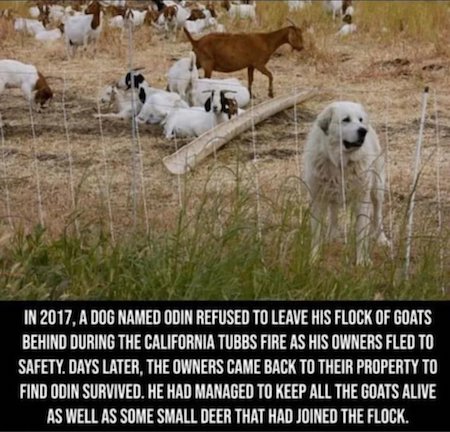

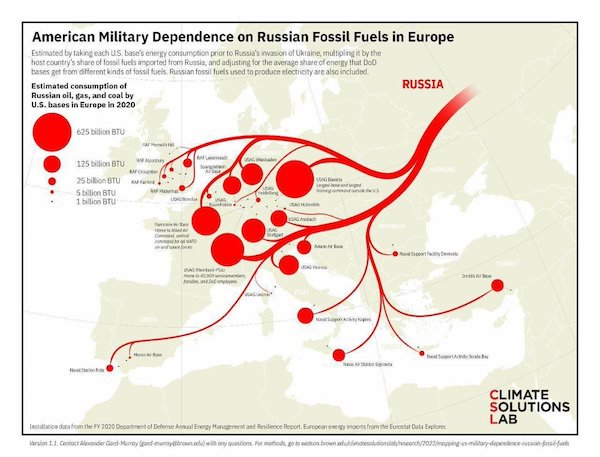





Support the Automatic Earth in virustime with Paypal, Bitcoin and Patreon.




